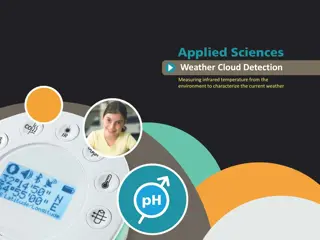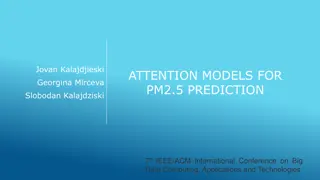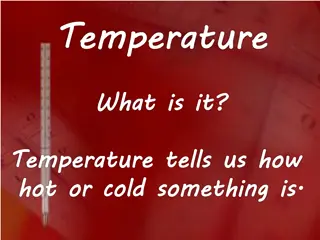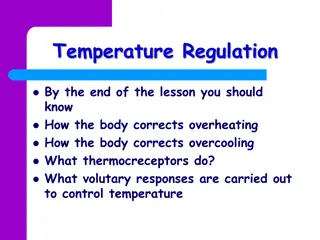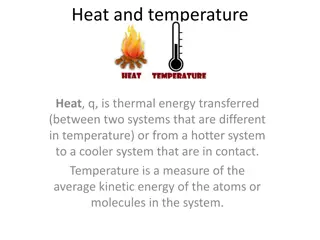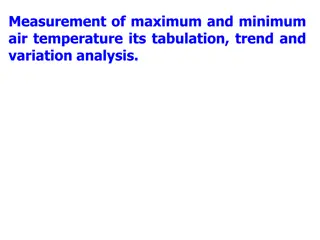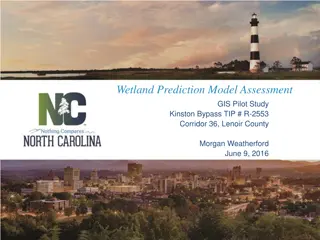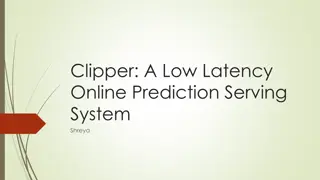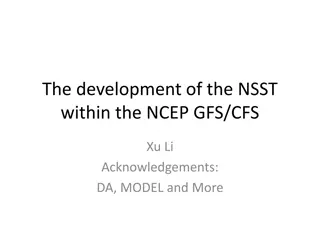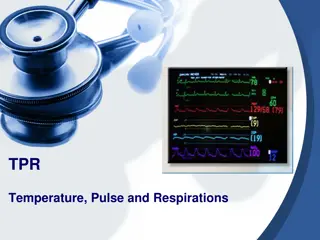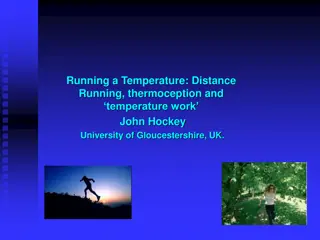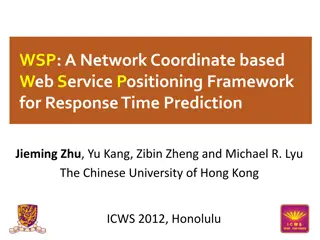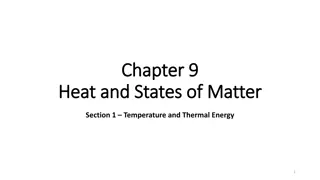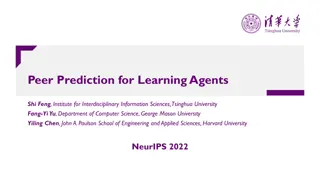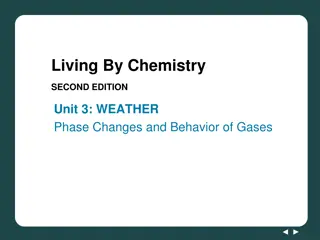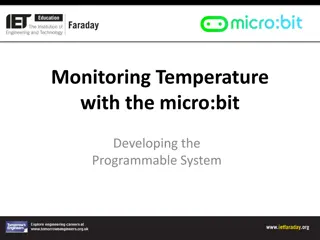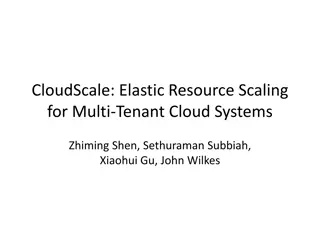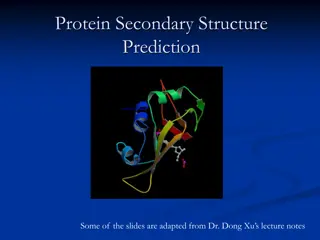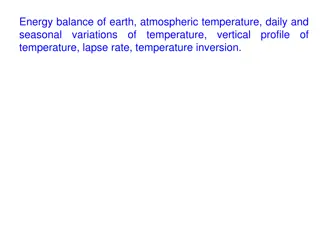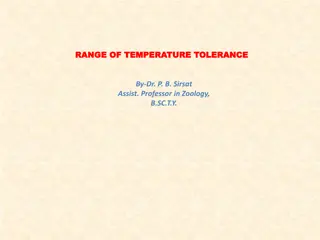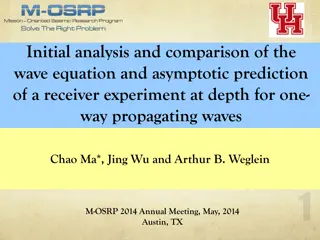Address Prediction and Recovery in EECS 470 Lecture Winter 2024
Explore the concepts of address prediction, recovery, and interrupt recovery in EECS 470 lecture featuring slides developed by prominent professors. Topics include branch predictors, limitations of Tomasulo's Algorithm, various prediction schemes, branch history tables, and more. Dive into bimodal,
0 views • 42 slides
Understanding Temperature Distribution and Differences in Heat
Explore the distribution of temperature across latitudes and elevations, and learn about the difference between heat and temperature. From horizontal to vertical variations, discover how factors like latitude influence temperature distribution patterns globally. Gain insights into the fundamental co
11 views • 19 slides
Understanding H.264/AVC: Key Concepts and Features
Exploring the fundamentals of MPEG-4 Part 10, also known as H.264/AVC, this overview delves into the codec flow, macroblocks, slices, profiles, reference picture management, inter prediction techniques, motion vector compensation, and intra prediction methods used in this advanced video compression
3 views • 32 slides
Exploring Weather through Infrared Temperature Detection
Studying everyday weather using infrared temperature detection from the environment can help in understanding the relationship between temperature variations of different objects and weather conditions. This activity involves creating hypotheses and testing them using an infrared temperature sensor.
0 views • 20 slides
Advancements in Air Pollution Prediction Models for Urban Centers
Efficient air pollution monitoring and prediction models are essential due to the increasing urbanization trend. This research aims to develop novel attention-based long-short term memory models for accurate air pollution prediction. By leveraging machine learning and deep learning approaches, the s
0 views • 17 slides
Understanding State of Charge Prediction in Lithium-ion Batteries
Explore the significance of State of Charge (SOC) prediction in lithium-ion batteries, focusing on battery degradation models, voltage characteristics, accurate SOC estimation, SOC prediction methodologies, and testing equipment like Digatron Lithium Cell Tester. The content delves into SOC manageme
0 views • 32 slides
KFRE: Validated Risk Prediction Tool for Kidney Replacement Therapy
KFRE, a validated risk prediction tool, aids in predicting the need for kidney replacement therapy in adults with chronic kidney disease. Developed in Canada in 2011, KFRE has undergone validation in over 30 countries, showing superior clinical accuracy in KRT prediction. Caution is advised when usi
0 views • 9 slides
Exploring Temperature: Facts, Measurement, and Scales
Understanding temperature is crucial in daily life. This content delves into the definition, measurement, and scales of temperature, highlighting key facts such as body temperature, freezing and boiling points of water, and extreme temperatures like those found in lightning and the sun. Discover how
1 views • 9 slides
Understanding Temperature Effects on Donor and Acceptor Ionization in Semiconductors
Temperature plays a crucial role in the ionization of donor and acceptor atoms in semiconductors. In N-type semiconductors, the Fermi level lies below the conduction band, while in P-type semiconductors it lies above the valence band, with the position depending on temperature and impurity atoms. Do
1 views • 13 slides
Understanding Body Temperature Regulation
Explore how the body maintains its internal temperature through mechanisms such as correcting overheating and overcooling, the role of thermoreceptors, and voluntary responses that help control temperature. Discover the importance of regulating internal body temperature for optimal enzyme-catalyzed
2 views • 18 slides
Real-time Experimental Lightning Flash Prediction Report
This Real-time Experimental Lightning Flash Prediction Report presents a detailed analysis of lightning flash forecasts based on initial conditions. Prepared by a team at the Indian Institute of Tropical Meteorology, Ministry of Earth Sciences, India, the report includes data on accumulated total li
0 views • 6 slides
Understanding Heat and Temperature in Thermodynamics
Thermal energy transfer, heat, and temperature play crucial roles in determining the behavior of systems in terms of kinetic energy and molecular motion. The zeroth law of thermodynamics establishes the relationship between heat and temperature. Heat transfer leads to changes in the average kinetic
8 views • 8 slides
Privacy-Preserving Prediction and Learning in Machine Learning Research
Explore the concepts of privacy-preserving prediction and learning in machine learning research, including differential privacy, trade-offs, prediction APIs, membership inference attacks, label aggregation, classification via aggregation, and prediction stability. The content delves into the challen
0 views • 11 slides
Understanding Temperature Measurement in Plant Growth
Exploring the measurement of maximum and minimum air temperature, its significance in analyzing trends and variations, and how temperature impacts plant growth stages. The optimal temperature ranges for different plant species and the importance of maximum and minimum temperature recordings using sp
0 views • 20 slides
Wetland Prediction Model Assessment in GIS Pilot Study for Kinston Bypass
Wetland Prediction Model Assessment was conducted in a GIS pilot study for the Kinston Bypass project in Lenoir County. The goal was to streamline project delivery through GIS resources. The study focused on Corridor 36, assessing various wetland types over a vast area using statistical and spatial
0 views • 16 slides
Clipper: A Low Latency Online Prediction Serving System
Machine learning often requires real-time, accurate, and robust predictions under heavy query loads. However, many existing frameworks are more focused on model training than deployment. Clipper is an online prediction system with a modular architecture that addresses concerns such as latency, throu
0 views • 17 slides
Understanding Near-Surface Sea Temperature Development in NCEP GFS/CFS
This informative piece delves into the evolution of Near-Surface Sea Temperature (NSST) within the NCEP GFS/CFS, discussing its significance in Numerical Weather Prediction (NWP) systems, the utilization of sea surface temperature (SST), and the T-profile near the sea surface. It covers the role of
0 views • 28 slides
Understanding Temperature Measurement in Healthcare
Temperature, Pulse, and Respirations are vital signs used to assess a patient's health. Temperature can be measured through various methods such as oral, rectal, axillary, tympanic, and temporal routes using different types of thermometers. It's important to know the normal temperature ranges for di
3 views • 39 slides
Theoretical Justification of Popular Link Prediction Heuristics
This content discusses the theoretical justification of popular link prediction heuristics such as predicting connections between nodes based on common neighbors, shortest paths, and weights assigned to low-degree common neighbors. It also explores link prediction generative models and previous empi
0 views • 39 slides
Using Decision Trees for Program-Based Static Branch Prediction
This presentation discusses the use of decision trees to enhance program-based static branch prediction, focusing on improving the Ball and Larus heuristics. It covers the importance of static branch prediction, motivation behind the research, goals of the study, and background on Ball and Larus heu
0 views • 36 slides
The Phenomenology of Temperature Awareness in Distance Running
Researchers at the University of Gloucestershire explore the embodied consciousness of distance runners, focusing on thermoception and temperature regulation. Utilizing sociological phenomenology and phenomenological ethnography, the study delves into the sensory experiences of runners, emphasizing
0 views • 29 slides
Exploring Temperature: From Touch to Thermometer
Explore the concept of temperature in Year 4 lesson 1, understanding that touch is not always accurate in judging temperature. Engage in activities to test different temperatures and discover the limitations of using the sense of touch. Lesson 2 introduces using a thermometer to measure temperature
0 views • 43 slides
Comprehensive Solution for EU Digital COVID Certificate Verification
This solution offers face recognition, temperature monitoring, and verification of EU Digital COVID Certificates for personnel. It includes products like DHI-ASI7213X-V1-T1 and ASF172X-T1, with various unlocking modes and support for certificate verification. The system allows for accurate and fast
0 views • 7 slides
Understanding Causality in News Event Prediction
Learning about the significance of predictions in news events and the process of causality mining for accurate forecasting. The research delves into problem definition, solution representation, algorithms, and evaluation in event prediction. Emphasis is placed on events, time representation, predict
0 views • 36 slides
Overview of Synthetic Models in Transcriptional Data Analysis
This content showcases various synthetic models for analyzing transcriptome data, including integrative models, trait prediction, and deep Boltzmann machines. It explores the generation of synthetic transcriptome data and the training processes involved in these models. The use of Restricted Boltzma
0 views • 14 slides
Network Coordinate-based Web Service Positioning Framework for Response Time Prediction
This paper presents the WSP framework, a network coordinate-based approach for predicting response times in web services. It explores the motivation behind web service composition, quality-of-service evaluation, and the challenges of QoS prediction. The WSP framework enables the selection of web ser
0 views • 30 slides
Understanding Heat, Temperature, and States of Matter
Exploring the concepts of heat and temperature in relation to the kinetic theory of matter, this content delves into the difference between heat and temperature, the kinetic energy of particles, temperature scales, thermal energy, and specific heat. It also provides formulas for temperature conversi
0 views • 10 slides
Understanding Peer Prediction Mechanisms in Learning Agents
Peer prediction mechanisms play a crucial role in soliciting high-quality information from human agents. This study explores the importance of peer prediction, the mechanisms involved in incentivizing truthful reporting, and the convergence of learning agents to truthful strategies. The Correlated A
0 views • 7 slides
Low Temperature Thermometry Overview
Temperature measurement, known as thermometry, involves assessing local temperature levels for various applications. A good low-temperature thermometer should offer reproducibility, high sensitivity, and a wide operating range. Primary thermometers directly measure properties of matter, while second
0 views • 25 slides
Understanding Temperature Measurement in Mechanical Engineering
Exploring the concepts of temperature measurement in mechanical engineering, this article covers topics such as temperature scales, the ideal-gas thermometer, and the relationship between temperature and heat. With detailed explanations and visual aids, it provides insights into how temperature is m
0 views • 25 slides
Understanding Temperature Measurement with Thermometers
Explore the principles of temperature measurement through thermometers, understanding phase changes, behavior of gases, and creating temperature scales. Compare weather forecasts between Moscow and Washington, discussing which city will be warmer and predicting precipitation types. Dive into discuss
0 views • 14 slides
Developing a Food Temperature Probe with BBC micro:bit
Design and develop a programmable system using the BBC micro:bit to create a prototype food temperature probe. The system should include a temperature sensor to detect food temperature, a buzzer to sound a warning if the food is too cold, and an LED screen to display the food temperature. Follow the
0 views • 9 slides
CloudScale: Elastic Resource Scaling for Multi-Tenant Cloud Systems
CloudScale is an automatic resource scaling system designed to meet Service Level Objective (SLO) requirements with minimal resource and energy cost. The architecture involves resource demand prediction, host prediction, error correction, virtual machine scaling, and conflict handling. Module 1 focu
0 views • 37 slides
Amendments to WIPPS Manual for Climate Prediction at INFCOM-3, April 2024
The document discusses amendments to the Manual on WIPPS for climate prediction, including new recommendations for weather, climate, water, and environmental prediction activities. It introduces concepts such as Global Climate Reanalysis and the coordination of multi-model ensembles for sub-seasonal
0 views • 10 slides
Protein Secondary Structure Prediction: Insights and Methods
Accurate prediction of protein secondary structure is crucial for understanding tertiary structure, predicting protein function, and classification. This prediction involves identifying key elements like alpha helices, beta sheets, turns, and loops. Various methods such as manual assignment by cryst
0 views • 30 slides
ACE RAM Workshop - Barcelona 2019: Reliability and Maintenance Concepts
The ACE RAM Workshop conducted by George Pruteanu in Barcelona focused on topics such as RAM prediction, FMEA, maintenance concepts, preventive and predictive maintenance, condition monitoring systems, corrective maintenance, and design for maintenance. The workshop delved into reliability predictio
0 views • 16 slides
Understanding Earth's Energy Balance and Temperature Variations
Earth's energy balance is crucial for maintaining atmospheric temperature and regulating daily and seasonal temperature changes. The net radiation, consisting of incoming shortwave and outgoing longwave radiation, plays a key role in this balance. Components such as sensible heat flux, latent heat o
0 views • 18 slides
Understanding Body Temperature Regulation and Factors Affecting It
Body temperature regulation is a complex process involving the balance of heat production and loss. Factors like age, hormones, stress, and environmental changes can influence body temperature. Heat production is affected by factors such as basal metabolic rate, muscle activity, fever, and sympathet
0 views • 24 slides
Temperature Tolerance of Organisms in the Universe
Life on Earth exists within a range of temperatures, with organisms displaying varied temperature tolerance. Eurythermal organisms can withstand large temperature fluctuations, while stenothermal organisms tolerate only small variations. The temperature range for each species is crucial for their ph
0 views • 8 slides
Analysis and Comparison of Wave Equation Prediction for Propagating Waves
Initial analysis and comparison of the wave equation and asymptotic prediction of a receiver experiment at depth for one-way propagating waves. The study examines the amplitude and information derived from a wave equation migration algorithm and its asymptotic form. The focus is on the prediction of
0 views • 23 slides



